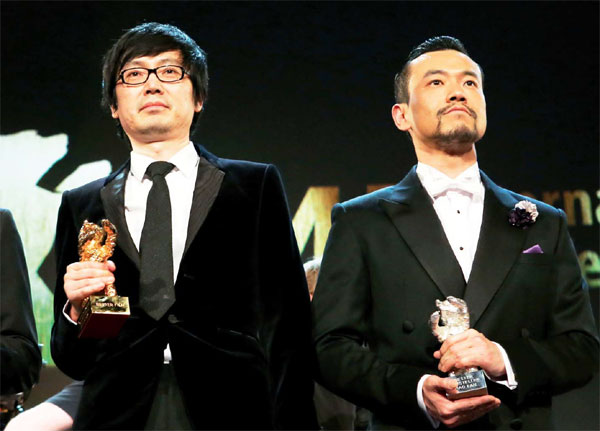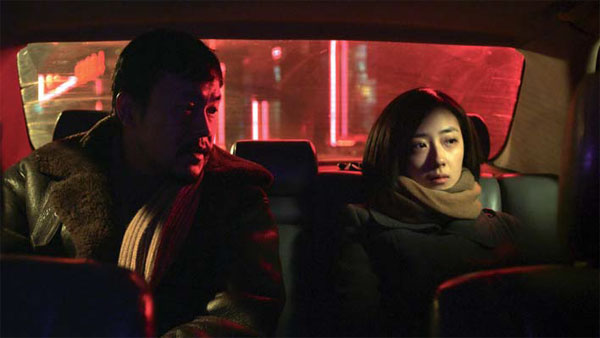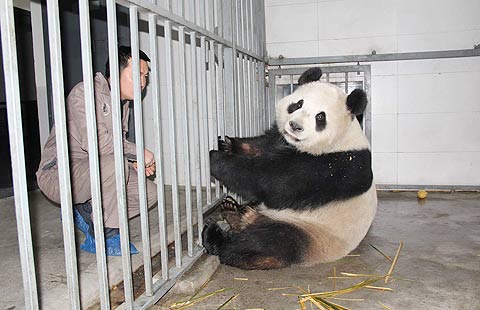Chollywood goes arty
Updated: 2014-02-21 08:33
By Raymond Zhou (China Daily Europe)
|
|||||||||||
|
Diao Yinan, writer-director of Black Coal, Thin Ice, with the Golden Bear and Liao Fan, the lead actor of the movie, with the Silver Bear at the 64th Berlin International Film Festival. Zhang Fan / Xinhua |
|
Liao Fan and Gwei Lun-mei are the lead actor and actress in the film. Provided to China Daily |
The re-emergence of Chinese films on festival circuits may point to parallel growth of art-house cinema along with the nation's booming movie industry
The winning of the top prize at a prestigious international film festival by a Chinese submission may speak as much about the state of Chinese cinema as the international perception of a certain body of Chinese work. The surprise ending of Black Coal, Thin Ice, a yet-to-be released film by a little-known Chinese auteur, taking home the coveted Golden Bear at the 64th Berlin International Film Festival has filled the home audience with more perplexity than euphoria. Of the three movies selected for the main competition of the festival, No Man's Land by Ning Hao has already become a critical and commercial darling in its home market, and Blind Massage, though not yet released, is adapted from an award-winning best-seller. To most Chinese, Black Coal, Thin Ice had been an unknown quantity heavily discounted in crystal-ball gazing for award results.
Yet, it has now been revealed that this film, among all three Chinese contenders, was the first picked by the festival curators, and just to show the keenness of their foresight, was the favorite of the jury as soon as they watched it. It was the front-runner all along even though it had eluded prognosticators who use name recognition as a major yardstick.
Since deliberations by the jury were not available to the public, what follows is one man's educated conjecture on what might have swayed the jurors.
Contrast of light and shadows
Diao Yinan, writer-director of Black Coal, Thin Ice, has a fascination with film noir, that special genre of crime thrillers popular in 1940-50s Hollywood. He made a meticulous study of classics like The Third Man and even recreated a scene on top of a Ferris wheel, albeit in a completely different dramatic situation. That kind of homage was sure to bring a smile to jury members who grew up on such cultural exposure.
Film noir, in general, is for the sophisticated in taste. It has since become a source of inspiration for younger generations of filmmakers. Diao did not imitate the style, though. He came up with his own version. While traditional noir uses black-and-white images and often sets the story in cities like Los Angeles, Diao uses the wintry landscape of suburban China as a sort of nondescript locale, creating moods that are distinctly Chinese and turning the ordinary into the slightly surreal. Streets with remnants of ice and snow, under dimly lit lamps, are totally devoid of dramatic tension in real life, yet exude an eeriness commensurate with the gruesome murders and the secrets behind each character. The sporadic and garish sources of light, such as neon on top of a building or arrays of bulks blinking in an amusement park, tend to contrast and accentuate the darkness in a way rarely seen in noir classics.
The story of Black Coal, Thin Ice takes place in contemporary China, but it is not social realism in the conventional sense. It does not tackle the wealth gap or any of the social ills of the era. The plot revolves around a trio of characters, each with a shady past. Zhang Zili is a policeman with a broken marriage and an equally derailed career. His pursuit of those behind the murders is personal and relentless, to the point that it may mirror the mentality of the criminal.
Liao Fan, who won the Silver Bear for best actor in Berlin, is nothing like Humphrey Bogart, the typical hard-boiled detective. He has an edginess all his own. In many of his roles, he displays an ability to cross over to the gray area of his characters' moral boundary and psychological health. It is a fascinating area for an actor and a small breakthrough in Chinese cinema with its rigid codes for certain types of roles.
Gwei Lun-mei also has a meaty role. It is not a femme fatale, but a woman of mystery nonetheless. The Taiwan actress plays a woman of few words, thus circumventing the pitfall of the telltale accent. As more of her secret is revealed, the role takes on more substance and Gwei embodies her complexity with authenticity in movements and postures. Wang Xuebing, an erstwhile heartthrob, plays a supporting role crucial to the plot. While he cannot hold a candle to Orson Welles in The Third Man, he conveys a lot of background information not as much by acting as by his enfant terrible disposition.
Festival games
The festival circuit is a game with its own rules. Generally speaking, you have to present quality films, but that does not mean all good films have equal chances. There is decidedly an art-house sensibility to it, which varies slightly from festival to festival and from section to section. By sheer gravitas, the top three festivals in Europe (Cannes, Berlin and Venice) wield enormous influence in the rest of the world, especially the Chinese-speaking world, and selections and winners are endlessly parsed for clues about elements that may click with curators and juries.
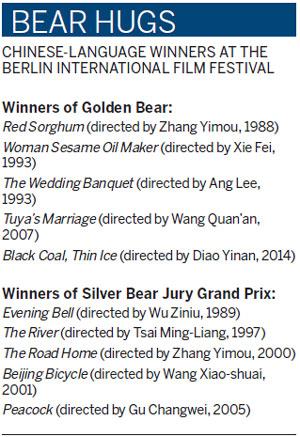
When Zhang Yimou's Red Sorghum won the first Golden Bear for a Chinese film, it marked the opening shot of the Fifth Generation on the world stage (even though a couple of other films such as The Yellow Earth had already made waves domestically). Because international festivals can bypass China's normal selection process, they have an advantage in spotting new talents and new trends. Filmmakers like Jia Zhangke and Wang Quan'an are beneficiaries of this outside force.
However, international recognition can also have the adverse impact of diverting attention and resources from areas of interest for mainstream Chinese audiences. When award winners eventually fail to find a reasonable audience at home, the awards themselves are increasingly seen as a stamp of elitist alienation from popular taste. This was especially poignant in Taiwan where festival favorites like Tsai Ming-liang have spawned imitators whose sole purpose is to win more awards and ignore the home market, thus losing it to foreign competition without even putting up a fight. The emergence of local hits, including Cape No 7, Monga and You Are the Apple of My Eye, none of which were made with any award hopes, is seen as a much needed correction.
The most abundant crop of global winners for the Chinese mainland appeared in the late 1980s and early 1990s, coinciding with the sharpest decline of Chinese cinema in attendance and box-office revenue. Though there was no causal effect in this case, it helped cement the public perception about the irrelevance of film festivals outside China in shaping the Chinese market. The fast expansion of this market in recent years, with a palpable absence of strong Chinese contenders on the festival circuit, serves to send a subtle message to film investors that you don't have to kowtow to "the 18 guys named Dieter in black turtlenecks" (in the words of Kaiser Kuo, founder and host of the Sinica podcast) to find success in the exploding China market.
The ripple effect of the win of Diao's film will be more accurately measured when it premieres domestically. How much of a box-office boost will be made as a result of the prestige and all the publicity that accompanies it? Will it attract a much larger audience than it otherwise would? Will it make the money back for its investors-maybe several times over? This will be scrutinized by many in the industry. To take a step back into the realm of critical reception, will it receive rave reviews from domestic cinephiles a la Red Sorghum or lukewarm ones like Tuya's Marriage, another Chinese work that nabbed the Golden Bear?
Assuming a reasonable turnout at the box office, Black Coal, Thin Ice may help highlight the diversity of Chinese cinema. Yes, the market is surging and genre movies are all the rage, but there is another front that focuses on artistic innovation. An individual filmmaker may choose one path, but a healthy film industry needs to develop in all directions. Without movies of mass appeal, winning kudos is just like the tip of the iceberg but with no iceberg underwater; and without artistic excellence, which festivals tend to endorse, the industry will be seen as nouveaux riches with no culture. Hopefully, from now on Chinese cinema will not sacrifice one for the other, but rather, have the two complement each other.
The writer is editor-at-large of China Daily and the author, most recently, of A Practical Guide to Chinese Cinema 2002-12 (in English).
raymondzhou@chinadaily.com.cn
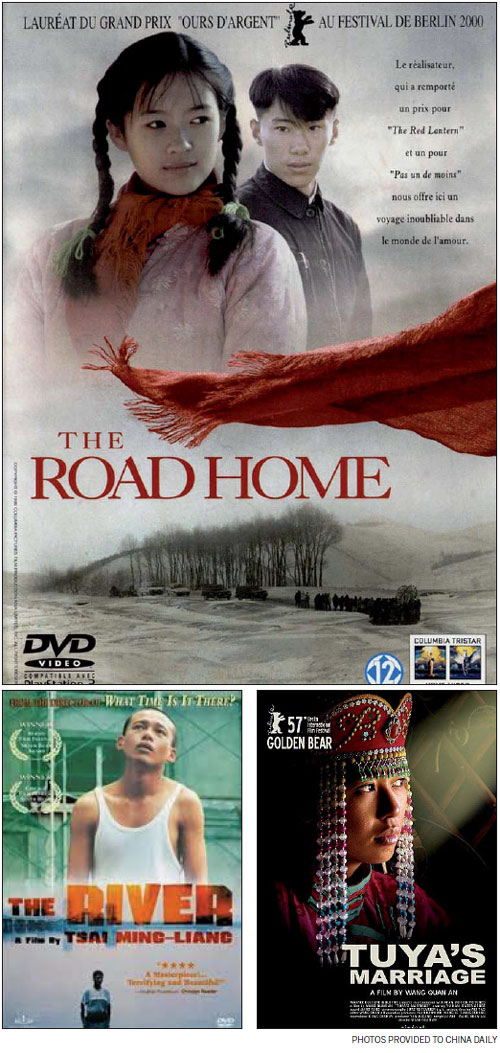
(China Daily European Weekly 02/21/2014 page24)
Today's Top News
Pandas arrive in Belgium
China urges US to correct mistakes on Tibet
9 punished for spreading flu rumor
Beijing upgrades haze alert
Ukrainian parliament dismisses president
China strongly opposes Obama-Dalai meeting
Tax refunds to lure overseas tourists
Prosecutors tackle food crimes
Hot Topics
Lunar probe , China growth forecasts, Emission rules get tougher, China seen through 'colored lens', International board,
Editor's Picks

|

|

|

|

|

|
